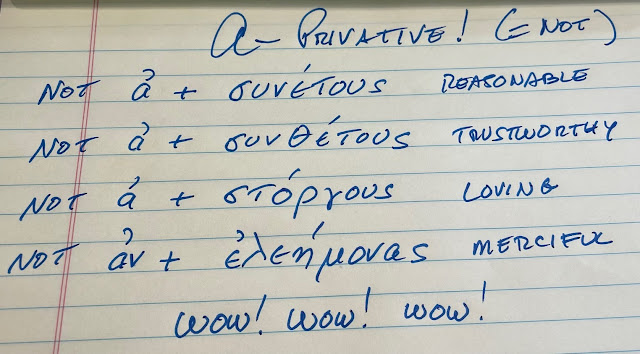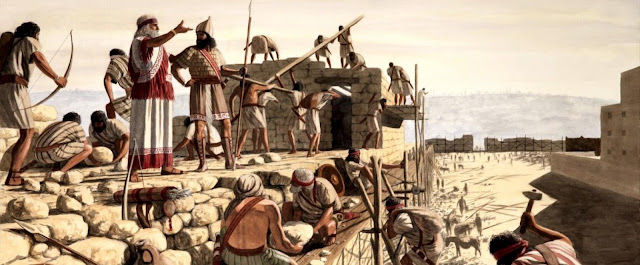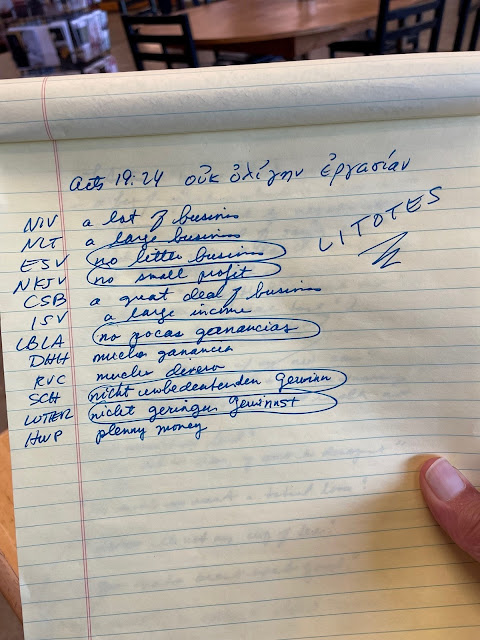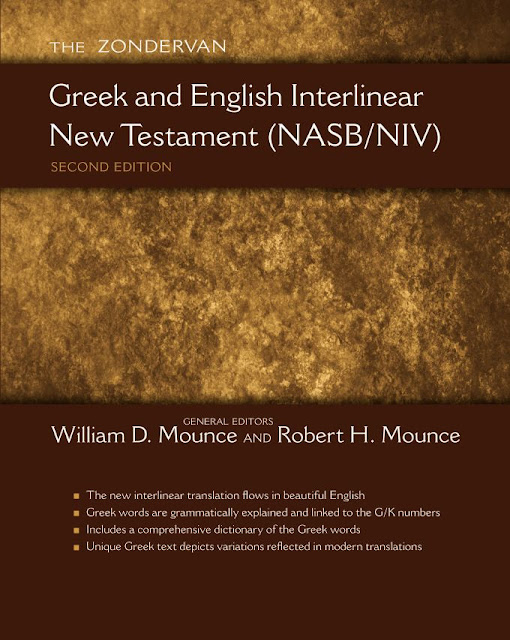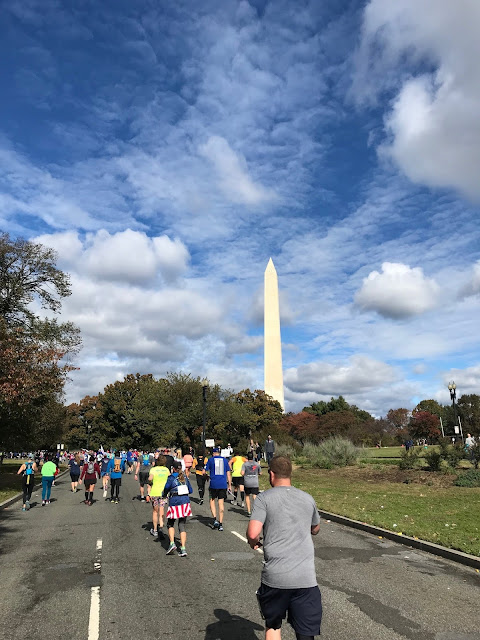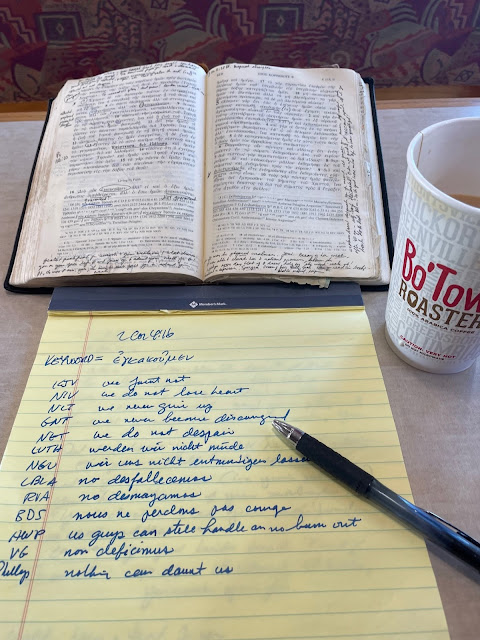Sunday, April 30, 2023
Stirring Up the Pot of God's Word
Becky and I used to say to each other, "Have I told you lately that I love you?" Well, have I told you lately that I love God's word? I do. I love its simplicity. I love its grandeur. I love its precision. I love its message. I love its beauty. Reading it daily is one of the greatest blessings of my life. When I read it I fall at his feet in worship and adoration. There's a lot in the book I don't understand, of course, and yet this is my favorite book in the whole world. Somehow the awesome power and glory of God is reflected in this book as much as in any sunrise or sunset. Need I say more? Who could not help but want to shout HalelluYah when reading God's holy word? Why, just this morning I saw this absolutely beautiful construction in Greek. It's Rom. 1:31:
Here we have four Greek adjectives, all beginning with the letter alpha. Now in Greek, an alpha at the beginning of a word usually negates the idea being spoke about. It's sorta like the "un" prefix in English. You can be "happy" or "unhappy," for example. Here in Rom. 1:31, Paul has taken 4 Greek adjectives and then negated them by using an alpha. See?
I guess the next question is: Can we bring this over into English? One English translation called the New American Bible (a Roman Catholic version) has succeeded quite nicely in doing this. But instead of using an "un" at the beginning of the word they use the suffix "less" (which has the same meaning). Here's what the NAB has:
senseless, faithless, heartless, ruthless.
Now that is some nice translating! I like it better than the ESV's "foolish, faithless, heartless, ruthless." Close, but no cigar.
But is there any way we can put the negation at the beginning of the word in English (like it is in Greek) rather than at the end? Yes indeed. What do you think about this?
unreasonable, untrustworthy, unloving, unmerciful.
Do we get at least an "A" for effort?
Incidentally, the Greek word for "unloving" is astorgous = not storgous. As Hendricksen points out in his Romans commentary, "The meaning is without natural affection" (p. 82). He adds -- and oh how telling this is! -- :
"It was not at all unusual for pagans to drown or in some other way to destroy unwanted offspring. In this connection think of present-day abortion, for which all kinds of excuses are being invented."
Ouch!
Now, these kinds of sound patterns in Greek are not uncommon in the New Testament. They would have delighted the ears of the audience to whom they were first read, just as they delighted my ears as I "heard" them in my mind this morning.
Did you ever look at a big pot of soup that was sitting on the stove? Not cooking but just sitting. Would you ever have guessed in a million years what was underneath it? Nope. You never could until you took a spoon and stirred it and then you found a wealth of goodies under the surface. But if all you do is just look at the top, you won't find too much to get excited about.
Forgive the lame analogy, but I teach Greek in order to give my students a spoon to stir with. I tell them, "Okay, it's time to take a big old soup ladle and stir up all the goodies that God has placed within his word. When you do that, believe me, you will find things you never dreamed of before you started stirring."
So yes, I love God's word. Every word. Everywhere. Not to mention all the amazing literary devices you can find by stirring the pot.
How about you?
Be ye stirrers of the word and not lookers only!!
Greek Is Not Hard
"Greek is not hard."
(Wait. That's not the whole tweet.)
"Greek is not hard. For many of us, it's impossible!"
Yep. It's impossible without God's help.
Today is the fourth Sunday of Easter, also known as Good Shepherd Sunday. So let me remind you what Psalm 23:1 says:
"The Lord is my Shepherd, I shall not want."
I love how the Living Bible renders this:
"Because the Lord is my Shepherd, I have everything that I need."
I dropped out of my Greek class at Biola after only 3 weeks. But he didn't let me give up. Two years later I was hired to teach 11 units of Greek there. You don't defeat your weaknesses in the power of the flesh. You turn to the Lord, your Shepherd, who will give you what you need.
I guess what I'm trying to say is this. The ability to learn a foreign language is a gift of God. Even if you have no natural language aptitude (like me) and have to work hard at everything, confess your weaknesses to the Lord and he will help you. I need not laud or underestimate myself. Let me be occupied with the Lord and find completion in him. That will deliver me from being proud of my successes or discouraged by my failures.
"My soul, wait only upon God, for my expectation is from him" (Psalm 62:5). Yes,
EXPECT MUCH FROM HIM.
Saturday, April 29, 2023
A Loan Word in the Latin of Eph. 4:5?
Dare to Be Different
Pastor friend, tomorrow (Sunday), dare to be different. If you have to, swim against the stream. This includes the cultural stream. "Only dead fish run with the current" (Malcolm Muggeridge). We are not to be blown about by the winds of public opinion. We are to stand out in stark contrast against our surroundings, standing up for the uniqueness and authority of Scripture and over against materialism and relativism.
God bless you!
Power for Ministry (Col. 1:29)
It's weird living in Virginia. Yesterday we had a long, soaking rain, but today the sun was out and the temps were a perfect 70 degrees. Take a look at this. An unfiltered glimpse of my morning workout. It was pure joy.
After that I drove to Farmville to get in a 6 mile run on the High Bridge Trail.
As I went from the gym to the trail, I thought about why we humans like to do hard things. I mean, isn't it a lot easier to sit on our duffs on a Saturday morning and not even attempt to move? Yes, maybe it's easier -- a lot easier -- but it isn't better. Easy is not the point.
I thought back to the verse I studied this morning in my Bible time -- Col. 1:29.
Here Paul says that he "labors" and "struggles" as he seeks to present everyone mature in Christ. Both Greek verbs ("labor" and "struggle") are metaphors implying great physical exertion. The first is an agricultural metaphor and is used of the farm laborer. The second is an athletic metaphor and is used of the competitor in the Greek games. If you've ever worked in the garden or played sports, you will know exactly what Paul is talking about. Anyone who farms knows just how sweaty an affair it is.
And anyone who's run a 32-mile ultramarathon knows the struggle you go through just to finish the race.
Thankfully, adds Paul, as we labor and struggle to serve Jesus, we do so "with all his energy, which so powerfully works in me." To know Christ is to know the power of his resurrection and the fellowship of his sufferings. And we can experience increasingly that power every day. However, even though Paul had constant access to divine energy, he still had to labor and struggle! The good news is that the Spirit prepares us for the daily grind and also fires us with unusual strength for the special task. Isn't that great?
May God grant us all a full, clear vision for what ministry involves (hard work!) as well as a renewed dependence on Christ for the energy needed to fulfill our ministries!
Friday, April 28, 2023
Mastering the Pronunciation of the Language You're Learning
The Joy of Verbless Clauses
I love the "rules" of English grammar, don't you? These include:
Always avoid the apt art of alliteration.
The passive voice is to be avoided.
Prepositions are not words to end sentences with.
Get my drift? How 'bout this "rule":
Never a verbless clause in English!
Pure nonsense, of course! You don't need an explicit verb to make perfectly good sense of a sentence. Need proof?
I ran a 5K, my sister a marathon.
I write textbooks, my brother novels.
I arrived today, my sister yesterday.
KNX News Radio time, 5:30.
Now, what is true in English is even more true in Greek. The lack of an explicit verb in clauses with a predicate ("I am a teacher") isn't at all rare or awkward. Did you know that one out of three clauses with predicates in New Testament Greek are verbless? Perhaps the most famous are:
Great ... your faith.
For the laborer ... worthy of his wages.
Your reward ... great in heaven.
The harvest ... great, but the workers ... few.
My favorite is the first Beatitude:
Blessed ... the poor in spirit.
Think of a newspaper headline:
BLESSED -- THE POOR IN SPIRIT!
Anyhoo, make me proud and keep all this in mind when you are translating the Greek New Testament into English.
On Preaching
Learn from that pastor who not only preaches biblically faithful messages but bases his sermon outlines on the text itself.
Greek Is Not a Hotdog Eating Contest
Learning to read New Testament Greek isn't a hotdog eating contest.
Sadly, you will find beginning grammars that are anywhere from 500 to 600 pages in length. Beginners need to learn what is essential, not everything an author wants to say about the language. Simple is not necessarily simplistic. Simple means "straightforward," as in a "simple solution." Simplistic means making something complicated seem simple by ignoring important parts of it. I prefer the word concise. A concise book is short and gets right to the point. "Concise" comes from a Latin word meaning "to cut down."
My (simple) message is this: Don't overwhelm beginners with information. Make things easy to understand, use relevant examples, and don't waste their time.
When We Still Grieve
Recently I was reading a book about grief and I thought to myself, How lovely is this conversation, how sensible. When my wife died almost 10 years ago, everyone said I should celebrate her life but at first I couldn't. I was sad, broken, and wore black (figuratively speaking) for a very long time because I had lost someone wonderful. If you have recently experienced loss and grief, at first your life will be diminished by it but in time it can be enhanced again. In the meantime, you will wonder if anything positive can come from your loss. May I say to you that it's alright to question that possibility. The book I was referring to above, The Empty Chair, puts it in these marvelous words:
God does not want us to forget our past. God does not want us to forget the good times, the hard times, the success, the mistakes. God does not ask that you forget that wonderful, at times conflictual relationship. The battle is over for your loved one. Death has come. Now you can experience his or her victory of a new life while constructing memories for yourself or your past life with your loved one.
You will ALWAYS have a relationship with the one you lost. Yes, in time, you will forget your loss to a degree, but when you do you won't feel like you are betraying your loved one. You are learning to invest your emotional energy elsewhere and, of course, are looking forward to being reunited again someday. Even though the emotional pain never leaves, you will eventually be able to move on with your life. The pain will subside. Your grief will be infused with hope. And you will be drawn ever closer to the One who is Lord over every loss and every heartache.
May that be your blessed experience today, my grieving friend.
Thursday, April 27, 2023
Don't Leave Greek on the Chalkboard
In a recent video that has gone viral on YouTube, Calvin Robinson said, "Either all of Scripture is God-breathed, or it is not. Either we believe Christ, or we don't."
More than ever, you and I, as educated lay people, need to take responsibility for knowing what the faith is. I think the number 1 priority for Christian people today is recovering our confidence in the inspiration and inerrancy of sacred Scripture, because everything comes from that. I think the reason many church leaders today are unable to give a clear trumpet sound is because they've lost their confidence in Scripture. Everything asserted by the sacred writers should be considered to be asserted by the Holy Spirit. Honestly, people need to know that. We need to read the word of God and ask God to let it speak to us. We need to meditate on it, spend time in it.
In a time of unfaithful leadership, take responsibility for knowing the faith yourself. The Lord has given us the tools, including the Internet (that double-edge sword), to find the answers that teachers of former generations taught with dogmatic clarity. We have to be like a small dog that lies down at the feet of his master or better still a guard on sentry duty.
Once inerrancy is abandoned, however good the intentions of those who do it, the door opens to further departures from the truth. This is what inevitably happens when Christians stop believing in an infallible Bible.
Keep Building That Wall!
"So the wall was completed in early September -- just 52 days after we had begun" (Neh. 6:15).
" ...the work had been done with the help of God" (Neh. 6:16).
"So the wall was completed." What a fantastic statement! In two weeks, Greek 1 will be history. Hard-working students will experience the rewards of their efforts with a sigh of relief -- and a heart of gratitude to the One who made it possible.
As you and I remain faithful to whatever wall God has called us to build, we can be confident that it will be rebuilt. That said, I don't know if the wall is ever rebuilt. There's no throwing in the towel for the Christian wall-builder. We take more Greek. We rebuild a marriage. We choose to love again. We resolve conflict. We seek or grant forgiveness. We end a toxic relationship. We break a habit.
There are days when we will want to quit. And then something or someone will remind us of God's promise that he will help us, and hope is restored.
Let me encourage you -- the situation is anything but hopeless. The answer to any difficult task is not a book or a counselor but a relationship with Jesus Christ. This relationship allows us to slay all our dragons!
I'm so proud of my students. It has been a challenging journey. But the Lord been so faithful! Praise his name!!
Wednesday, April 26, 2023
It's TRI TIME!!!!
In June, I am planning on doing my first triathlon of 2023, Lord willing.
This will be my 10th tri. I love this race because (a) you get to swim on a hot day, (b) you get to ride a bike just like you were a kid all over again, (c) you get to experience something that only triathletes know about -- getting off your bike to start the run only to have your legs feel like overcooked noodles, and (d) you might, just might, have a chance to stand on the podium since so few guys the age of Methuselah are crazy enough to compete in this event. You should do this race if you enjoy a good challenge and if you like being warm (hello, no wetsuit!).
To be honest, I miss my old friend the triathlon. I hope to do three of them this summer if God should permit.
Tuesday, April 25, 2023
Our One True Hope
This blog is all about hope. While we address theological, social, and ethical issues, our main concern is about individual choices and values. In the midst of social turmoil and ecclesiastical apostasy, from my perspective the potential for positive renewal has never been greater as long as we recognize that Jesus Christ is the only true source of America's hope. We need to recover the biblical emphasis upon sin. Everything else -- be it societal disintegration or theological compromise -- grows out of that one problem. We will never resolve the other issues until we recognize that the problem is a problem of the heart. Eventually our future as a nation will depend on how we respond to God's call to repentance. What is happening in America, like the rest of the world, is a desperate search for a transcendent solution to our problems. Until this is realized, very little in our society will be worth saving.
Litotes in Acts 19:24 -- Should We Care?
I love this quote by the GOAT, A. T. Robertson:
During my Bible reading today I noticed an interesting expression in Acts 19:24.
Here we read about how a certain silversmith in Ephesus named Demetrius made "no little business" for the craftsmen there. Why not just say that he brought "a great deal of business" to them?
Well, the answer is that Luke loves to use a certain rhetorical device called litotes. Instead of saying something directly, you state that the contrary is NOT true. Hence a litotes always contains a negative ("It's not the best weather today, is it?"). Specifically, a litotes can be used to (1) soften a statement, (2) avoid addressing an issue head-on, or (3) create a (humorous) understatement. Here are some examples:
- "I'm not unhappy with my new car."
- "That meal wasn't half bad."
- "If you take his class, you won't be disappointed."
- "It's not my cup of tea."
- "Your grades aren't exactly good."
- "The Greek participle is really not all that hard."
Here in Acts 19:24, "he made no little business" for the craftsmen probably means something like "he made a ton of money" for them.
So my question is, "Do we lose something of importance if we change the negative into a positive?" Or I could ask it this way: "Should we generally try to retain the grammar of the original when we translate the Bible into English?" The longer I study Greek, the more inclined I am to answer yes to both questions.
Anyhow, here are a few translations for you to compare.
What do you think?
In the Gym, Quality Is Better Than Quantity
Facts Are Facts
Facts are facts. The truth is what it is. If we can just create our own facts, then we will never be able to agree on anything. It is not your truth or my truth but the truth. That is why biblical exegesis allows no place for standpoint epistemology. Ever. Full stop.
Monday, April 24, 2023
Should I Use a Greek-English Interlinear?
"When learning Greek, never use an interlinear New Testament."
Nah.
Interlinears can be some of the most useful tools when acquiring a foreign language. I used them regularly while teaching myself German, Latin, and French. I have at least 4 Greek-English New Testament interlinears in my office. I don't use them nowadays but I will always be glad I had them when I was starting out.
The ideal is to be able to read your Greek New Testament without any helps. In the meantime, halitosis is better than no breath at all (as one preacher once put it).
Listen to the Kigali Agreement Being Read Aloud
Hey folks. You can listen to the Kigali Agreement in this YouTube. It brought tears to my eyes.
This is a controversial document. It has to be. But in my opinion it represents matters fairly and objectively. In my teaching career I have repeatedly stated that the Bible teaches its own inerrancy, authority, and sufficiency. When liberals try to persuade me that I am wrong, I reply that I did not write the Bible. No one can make the argument for the accommodation of Scripture to the world from the data of the Bible itself. Anyone who doesn't like what the Kigali Agreement states should not blame the conservatives for what they wrote. They are simply telling it like it is.
I am so grateful to God that not all Anglican groups have been silent in the face of the inroads errancy has made in the CoE. I have no doubt in my mind that if evangelical Anglicans would stand firm and tall for the authority of the Bible, a new day would dawn and the blessing of God would follow. To that end I most fervently pray.
I Am Blessed ...
... to have received two new books today. The first comes from my esteemed colleagues Chuck Quarles and Scott Kellum. The second is a copy of Hassan Siddiqui's doctoral dissertation. I had the joy of serving as Huss's major professor. In case you can't read its title, it is "The Significance of the Byzantine Text for Textual Criticism within the Book of Acts."
Thank you, gentlemen, for sending me your works. I am blessed!
On Grief (and the Passive Voice in Greek)
Most Greek verbs are in the active voice in the New Testament. But certainly not all of them. That's why I am eager to introduce to my students -- for the first time! -- the middle and passive voices today.
In essence, these voices call attention to the grammatical subject of the sentence. This is why I have a problem with how the GNT renders Matt. 5:4:
"Happy are those who mourn; God will comfort them!"
This statement is undoubtedly true. But Matthew uses the passive voice here, not the active. Here's the ESV:
"Blessed are those who mourn, for they shall be comforted."
The idea is: THEY will be comforted. They of all people! In fact, the Greek adds the word "themselves" to make sure we get the idea. Hence the ISV's:
"How blessed are those who mourn, for it is they who will be comforted!"
Grief in life is inevitable, but it's not inevitable that we go through it alone. What an incredible truth!
Sunday, April 23, 2023
Dissonance and the Music of the Night
I've just taught myself to play Andrew Lloyd Webber's phenomenal Music of the Night on the piano. Here's the orchestral version that was performed at the Royal Albert Hall featuring the one and only Ramin Karimloo.
Since I don't have the sheet music, the last five chords of the piece stumped me (time stamp: 5:25). Then I figured it out. You go from F
to Dm
to Dbm (= Db, Fb, Ab)
to B
ands finally to C
The entire time you are playing a C note with your pinky, which, of course, clashes mightily with the second to the last chord (the B chord). B and C are NEVER played together because they create such dissonance. Which is exactly why everyone loves the ending of this piece so much. Try it on your piano at home. Play a single B triad (= B, D#, F#). At the same time, add a C an octave higher. The B and the C will clash. But you will LOVE the sound. I'm not a music theorist, but I suspect that's because consonant chords are sonic oatmeal -- great for a steady diet but boring as all get out. You'll soon want to throw in a dissonant chord to spice things up.
To me, dissonance has always been a beautiful sound. It's like a splash of an extremely bright color on an otherwise tame canvas. Of course, you can get carried away with it. But it's a good reminder that sometimes people find music pleasurable because of its negative valance. I know I do.
Happy Lifting!
It was so good to be able to get back to the gym today after a hiatus. As a beginner I don't even truly know what my weak points are yet.
I also don't have enough training under my belt to know how well or how poorly each muscle is going to respond to my workouts over time, since everyone has different genetics and therefore each person's muscles grow faster or slower depending on that factor.
Thankfully, every "fit" person was a beginner at some time. Anyone can do it. It's just a matter of proper execution -- and tons of patience. Like most things in life!
Most people I know are not lazy. They just need that strong incentive to justify putting forth the effort. That might appear unattainable or out of reach now for you, but take it from me -- even the klutziest people can have a goal and get results.
Happy lifting!
Once More: On Detecting Emphasis in the Greek New Testament
I love Greek. I love the new things I'm always noticing when I read my Greek New Testament. In church today, the message was from John 15. And there it was -- something I'd never seen before. John 15:15 reads in your Bible, "But I have called you friends." My Greek Bible, however, puts it this (emphatic) way:
"YOU I have called friends."
Don't think for a moment that that's an accident. It isn't. The doctrine of verbal-plenary inspiration is not just about the words of Scripture. Yes, each word is inspired by God -- theopneustos -- but so are the tenses and the moods and the voices and the word order and the phrase order and the rhetorical devices used, etc. I don't mean to suggest that translators are under an obligation to bring into English all of these nuances. That would be impossible. There is always some loss when we go from one language to another. I'm not an idealist when it comes to English Bible translations; I'm a realist. But (I repeat), never forget that there are things in the Greek text that are emphatic and that even the most literal Bible translation overlooks. Another example is Jesus's pronouncement, "I give you my peace" (John 14:27). (I discuss that verse here in case you're interested.) I am not surprised that Jesus' statement is so emphatic:
"It is MY peace -- yes, my VERY OWN peace -- that I am giving you."
I love that expression! You know why? Because that's exactly the kind of peace that I need. And that you need.
My point? Secondary matters of interpretation may be less important when we read the Bible, but beware of making the less important unimportant.
Hate, Affirm, or Love Them
The sinner says to the Christian, "You will either hate me or affirm me." These are the only two options afforded. But the Christian can do neither. We can neither hate nor affirm the sinner. The Bible doesn't allow us to hate them. And the Bible doesn't allow us to affirm them. The Bible calls us to love them.
At a place called Calvary, Jesus put his life on the line for his friends. The world hasn't gotten over it yet.
Richard Hooker on Schism
"That which they call schism, we know to be our reasonable service unto God and obedience to his voice which crieth shrill in our ears, 'Go out of Babylon, my people, that you be not partakers of her sins, and they ye receive not of her plagues'."
The Missionary Spirit Is Also the Spirit of Truth
I once wrote a book about the marks of a "New Testament" church. Others have written about the marks of a "healthy" church (Dever) or a "living" church" (Stott). The book of Acts is a needed corrective to our perhaps poorly stated titles. Acts is a reminder to us that Christian history is not merely a record of the acts of men but the revelation of a Spirit-founded, Spirit-constituted, Spirit-guided, and Spirit-filled church. To call the church a "New Testament" church or a "healthy" church or a "living" church is true and useful, but such language may blind us to the great revelation made in the book of Acts that all of the accomplishments of the church are consequences of the Spirit's decent upon in it in Acts 2. Acts does not begin with "Go" but "Wait" -- wait for the missionary Spirit who impels us to missionary work as he labors in us for the salvation of men and women worldwide. Hence the apostles in Acts were guided solely by their sense of the Spirit.
In this larger sense, if we believe in the Holy Spirit as he is revealed in Acts, we cannot help but be missionaries -- all of us. We must embrace the world because Christ through his Spirit embraced the world. But this Spirit is also the Spirit of truth. He never leads the church of God apart from the word of God. The liberals in the world, not just in the Church of England, have sought to make their autonomy -- their opinions -- superior to what is taught in the Scripture. What they disagree with, they dismiss. "Well, that was back then. The times have changed." They say this without realizing that it is the very word of God, God's revelation to man, they are rejecting. It is a historic moment for the church -- any church -- when a denomination votes to put the Bible to one side and to be led by contemporary society. That is a historic decision and it requires a historic response like the one we saw this week in Kigali. The decision to step away from the Bible cannot remain unchallenged. Just ask those orthodox Methodists who founded the Global Methodist Church.
"He who is not with me is against me," said the Savior. In a day of indefinite gray, how refreshing to see black and white. Evidently our Lord has no place for twilight zones. Be hot. Be cold. But not lukewarm. Sadly, the climate of compromise marks the Laodicean church still today. It is indeed time for a Spirit-led showdown on Carmel between Baal and Yahweh.
Saturday, April 22, 2023
Run Whenever and Wherever You Can
Two of us from the conference went for a jog last night in DC.
The evening was lovely. We ran to the Washington Monument and thence to the Capitol.
Never waste a good chance for a run.
Why Study Greek?
You can study Greek for the church and for yourself. You don't have to choose just one.
Global Anglicanism and the Kigali Agreement
While travelling this weekend I tried to keep up with the historic and ground-shaking events taking place within the global Anglican community this week in Kigali.
I have watched with great admiration as Gafcon and all the other people of God within the Anglican communion refuse to accommodate the Scriptures to the world. May the Holy Spirit use this historic moment to reform and renew Anglicanism worldwide.
You can read the full text of the Kigali Agreement here.
A Trip to DC
Howdy folks. Just back from my jaunt through the backroads of Virginia.
Thursday started out in the best way possible -- at a national park. Here's the famous stone bridge over Bull Run.
And the stone house.
It was here, after 8 hours of the bloodiest fighting this country had ever experienced, that the grand illusions of both armies were shattered, consumed in the devastation of battle. Sobering.
On a lighter note, seems you'll find Ethiopians everywhere in Northern Virginia. I enjoyed a wonderful authentic Habesha meal at Vera's Kitchen in Manassas. Betam konjono!!!!!!!!!!
The next morning I drove to the conference in DC at the Museum of the Bible. Here is the keynote speaker -- a renowned archeologist whose most recent findings at Mount Ebal in Israel are about to shock the world.
I can't tell you what he said (we were sworn to secrecy), but if you should see Scott Stripling on Fox News or CNN in the coming days, you'll know why. Outstanding lecture.
My paper went well. At least it seemed to provoke some excellent questions about the Byzantine Text.
I love conferences like this one for that very reason. They are a PRIME example of why people like me get together and talk about the Bible. We all need to have our views challenged.
This is my life. It isn't perfect. But I love it.
Wednesday, April 19, 2023
Trip Plans: DC Via Manassas
Daily Renewal (2 Cor. 4:16)
I snapped this during my morning run.
As I ran, a thought occurred to me: No one outruns aging. In a sense, that was also the message of the verse I studied in my morning Bible time, 2 Cor. 4:16.
Here Paul contrasts:
- The outward man with the inward man
- The physical with the spiritual
- The body with the soul
- Decay with renewal
Interestingly, in the Greek, both verbs are in the present continuous tense because both processes -- the outward decay and the inward renewal -- are going on continually. Note that the first process is unavoidable and inevitable. However, the second process is not. Renewal has to be sought and has to be cultivated. Indeed, inner renewal becomes all the more necessary because of our outward, physical decaying.
As we grow older, we have to come to to terms with this. The older we get, the more keenly aware we are of our own mortality. At the same time, as followers of Christ, we can experience daily grace and renewal. Think of the manna in the Old Testament. God supplied manna every morning to the children of Israel in the desert, so that the manna had to be gathered daily and none could be kept overnight until tomorrow. Likewise, God offers us a fresh supply of grace every day. Thus Paul says, "Just as our outer nature is wasting away (decaying), so our inner nature is being renewed day by day" (Greek: day and day). And so we feed on the manna of heaven day after day after day as we open God's word, be it at home or at Bojangles or wherever.
And what is the result? It is truly amazing. Here's how the first part of verse 16 is rendered in various translations:
- We faint not (KJV)
- We do not lose heart (NIV)
- We never give up (NLT)
- We never become discouraged (GNT)
- We do not despair (NET)
- Nothing can daunt us (Phillips)
When I tell people that I plan to run forever, I am of course using hyperbole. We all stop running at some point. I understand that. Everyone faces illness, injury, and other obstacles. Eventually these setbacks will lead to our deaths. In the meantime, the most important thing is to maintain our spiritual vitality. From the moment I turned 16, God instilled within me the most fanatical desire to read his word. I almost couldn't stand it. I thought the Bible was going to go out of print one day. I feared someone would come and take away from me all of my Bibles. I devoured God's word. Everywhere I went I had a Bible with me so that I could open it and see what God was saying to me. Feasting on the manna of God should be the most exciting, most stimulating part of our day, or at least one of the most exciting. If you want to end up a theologian, that's great. Study the Bible that way. But I'll let you in on a little secret. There's all the difference in the world between just reading the Scriptures and letting them come alive in your life. So before you even open your Bible, ask God to do something for you. Just pray a simple prayer: "God, may your Holy Spirit reveal the truth to me. What have you got for me this day? Not yesterday, not last year, but TODAY?" Let's try that, shall we?
Thank you, Father, for what you're doing in the heart of every person who reads this blog today. Thank you for loving us. May each of us have a renewed determination to spend time every day in your love letters, the Scriptures. Make your presence so real and so near and so dear as each one of us realizes that our own Bible is a personal love letter from you. Thank you. Amen.
Jesus, the Lamb of God
After my workout I checked on the animals.
Or should I say they checked up on me. Sweet.
When I see these sheep and lambs, my mind often goes to the Lamb of God who took away the sins of the world and I am made painfully aware of the huge disparity between my reaction when wronged and his, whose sole response to those who killed him was, "Father, forgive them, for they don't know what they're doing." He could have destroyed the whole lot of them. Instead, like a sheep before his slaughterer, he died for them. My personal lapses give me a clear picture of my desperate daily need for a Savior. But -- praise God! -- I now belong to the sheep of his fold, the children of God through faith in Christ Jesus. Jesus is the Chief Shepherd and the Door to the sheepfold. That is why we need not fear. This is our Father's world. There is nothing that can pluck us out of his hand.
Meanwhile, the kingdom we are building is not a world church. The Lord will establish it when he returns. And when that kingdom comes, the Lamb will be on his throne.
Tuesday, April 18, 2023
Good Morning!
A very good morning to you. I hope you and yours are doing well. Here in the Piedmont of Virginia the weather is 65 degrees, the sun is shining brightly, and a cool breeze is blowing -- perfect weather for working outdoors. Earlier today I went through my normal routine of Bible study, gym time, and cardio. Bible study is my absolute favorite part of the day. Jesus Christ is the most exciting person I've ever met. It's been 62 years since I came into a personal relationship with him and it, well, feels out of place to miss my daily appointment with him. I think about reading my Bible as being a personal counseling with session with Jesus and the apostles. For every need I have in my life, there is an answer wrapped up in the pages of this book. EVERY problem we face has an answer in this book if we will just open it and read it. God tells us exactly how to have an exciting Christian life if we will just open his word and hear what he's got to say!
At any rate, my reading today was in the final chapter of 2 Corinthians.
Here Paul tells us to "examine ourselves." Now, few of us like exams. My students will face a major exam next Monday. But listen -- it's hard enough to be examined. It's far harder to have to be both the examinee and the examiner at the same time. A Greek exam will make it clear to your prof whether you are "approved" (dokimos) or "disapproved" (adokimos). But it's far better if you are able to determine that for yourself. In essence, Paul is asking the Corinthians, "Are you real Christians? Do you pass the test? Or are you just pretending to be Christians when actually you aren't at all?" Likewise, a Greek teacher asks his or her students, "Are you really Greek students? Do you pass the test? Or are you just pretending to be a student when actually you aren't at all?" In verse 9, Paul writes, "Our greatest wish and prayer is that you will become mature Christians."
That is EXACTLY my prayer for my beloved students. Don't fake it. Don't pump sunshine when you're actually failing. Pass the test!
After that I reread this delightful book by the former president of the Columbia School of the Bible.
I would sum up its message as follows:
- One half of the world's population remains unevangelized.
- The church has failed to follow the Lord's mandate for evangelism with wholehearted zeal.
- Christians must give themselves completely to learn and to pray, to work and to witness for the completion of the mission task of the church.
Here are 3 quotes I think you'll enjoy:
"Obedience to God is never fulfilled through mere passive availability. It demands active involvement" (p. 73).
"Thus, the 'missionary call' has become a call to location, rather than a call to vocation" (p. 78).
And especially:
"Let us give ourselves to prayer till He ignites us with the flame of His love and scatters us as firebrands throughout the darkness of a lost world" (p. 84).
If you've ever struggled with your commitment to what Paul once called "the only thing that matters" (Phil. 1:27), this is a book you might want to consider buying and reading.
Then it was off to the gym:
As well as to the local high school for a training session focusing on hill work. The course takes you downhill for a half mile then back uphill for a half mile. Here I am about to run uphill again.
I kind of enjoy running hills. I have a short, shuffling stride that seems well tuned to hills. You have to run with choppy steps and keep your arm swing quick and compact. The key is to run by effort, not by pace. Today I worked on keeping my breathing rate exactly the same as when I am running on the flat. The goal I'm after is even-effort running.
Well, that's it for now. Thanks for stopping by. Let's keep our eyes heavenward, remembering that the road is narrow that leads to eternal life, and if we turn our eyes to things away from heaven, we can be distracted and end up being tempted to take the wide road.Monday, April 17, 2023
Praise, My Soul, the King of Heaven
Worshiping in my home tonight.
This is how great hymns have always been sung. It is truly uplifting and beautiful. This represents the very best of the English tradition of church music -- a large cathedral full of singers led by an expert choir. The choristers sing a descant in the final verse -- 30 boys whose voices rise above the singing of a thousand. I love this edifying and respectful type of music. It trumps the rock show music that is so often found in our American churches today. These hymns need not die.
Jesus, I bless your holy name. If we don't praise you, even the very stones will rise up in praise and worship of you. Can you imagine singing this in heaven with all the angels and saints? May our Lord and Savior reign forever and ever!
Praise, my soul, the King of Heaven;
To His feet thy tribute bring.
Ransomed, healed, restored, forgiven,
Evermore His praises sing.
Alleluia, alleluia!
Praise the everlasting King!
Missions for the Honor of His Name (Rom. 1:5)
My devotions this morning were in the book of Romans -- the grandest and plainest statement of the gospel in the New Testament.
I once called both Matthew and Luke Christian "manifestos." Likewise, Romans is a Christian manifesto, a manifesto of freedom through Jesus Christ.
As I read and studied Rom. 1:1-7, I thought of my daughter's husband who, along with a team from his church, left yesterday on an international mission trip to South Asia. Why did he go? Why do we go? Here Paul tells us why we go. We go because a right relationship with God is possible only by what Paul calls "the obedience of faith" -- a faith in Christ that leads to a life of obedience. But the ultimate goal of missions is much bigger than that. Its goal is the honor of Christ's name (1:5). We go because we are concerned with the name of Jesus Christ. To use biblical language, we are jealous for the name of Jesus Christ. This alone is the highest of all missionary motivations, higher even than wanting the nations to believe and obey, important as that is. The greatest missionary motivation is zeal for the glory of Christ. Jon left yesterday because he is concerned for the honor of his imperial majesty Jesus Christ. He came to Ethiopia with us three times for the same ultimate reason.
That is our great concern as we evangelize and disciple the nations -- the sake of his name. All other motives are unworthy ones. Hence Paul writes, "I am eager to share the gospel" (Rom. 1:15).
I don't know about you, but I sense that we have come to an unprecedented moment in history, a time when the potential for gospel ministry has never been greater. In the midst of political chaos and discontent, we are seeing a reawakening of the historic passion for missions that has always characterized evangelicalism. With God's help, I believe the turning tide before us will swell into a mighty, unstoppable wave of missionary activity for the honor of the name of Christ.
Sunday, April 16, 2023
Scenes from the Weekend
The beautiful Meymandi Concert Hall in Raleigh.
Last night's program had sort of an "otherworldly" flavor to it.
Needless to say, Holst's The Planets was performed flawlessly. How can such a small orchestra have such a big sound?
The audience demanded an encore -- and got one.
My notes from this morning's excellent sermon on Eph. 1:1-6. Yes, I outline practically everything in my life.
After church, I did an easy 7 mile run in Farmville.
While running I listened to the morning service from Stonebriar Church. Today Chuck addressed the awful problem of joylessness in the church. I've known people who have "hit the wall" -- of tight finances, intense pain, a broken marriage -- yet they've managed to convey hope and joy to all those around them. That's because their joy was not dependent on circumstances but on the Lord. That's a goal we can all strive for.
Finally, baby #8 has arrived. Our first brown one. Love its coloring.
Describe your weekend in 8 pictures!

